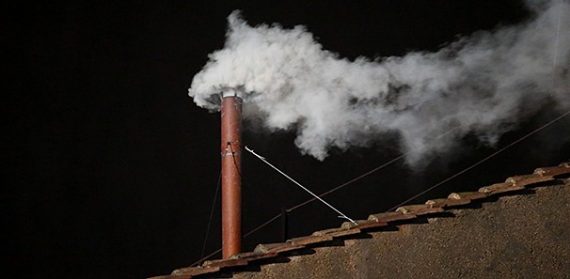Papal Conclave Ends With A Puff Of White Smoke
After just one and a half days and five ballots, the Papal Conclave has ended:
VATICAN CITY — With a puff of white smoke from the chimney of the Sistine Chapel and to the cheers of thousands of rain-soaked faithful, a gathering of Catholic cardinals picked a new pope from among their midst on Wednesday. The name of the new pope, the 266th pontiff of the Roman Catholic Church, was not immediately promulgated.
He inherits a church wrestling with an array of challenges that intensified during his predecessor, Benedict XVI — from a priest shortage and growing competition from evangelical churches in the Southern Hemisphere where most of the world’s Catholics live, to a sexual abuse crisis that has undermined the church’s moral authority in the West, to difficulties governing the Vatican itself.
Benedict abruptly ended his troubled eight-year papacy last month, announcing he was no longer up to the rigors of the job. He became the first pontiff in 598 years to resign. The 115 cardinals who are under the age of 80 and eligible to vote chose their new leader after two days of voting.
Before beginning the voting by secret ballot in the Sistine Chapel on Tuesday, in a cloistered meeting known as a conclave, the cardinals swore an oath of secrecy in Latin, a rite designed to protect deliberations from outside scrutiny — and to protect cardinals from earthly influence as they seek divine guidance.
The conclave followed more than a week of intense, broader discussions among the world’s cardinals where they discussed the problems facing the church and their criteria for its next leader.
“We spoke among ourselves in an exceptional and free way, with great truth, about the lights, but also about shadows in the current situation of the Catholic Church,” Cardinal Christoph Schönborn of Vienna, a theologian known for his intellect and his pastoral touch, told reporters earlier this week.
“The pope’s election is something substantially different from a political election,” Cardinal Schönborn said, adding that the role was not “the chief executive of a multinational company, but the spiritual head of a community of believers.”
The conventional wisdom suggests that an early end to the conclave means that one of the perceived front runners was able to build up enough support to get to the required 2/3 majority relatively quickly. Who that person is, however, is something we won’t know for about another half hour when the new Pontiff is introduced to the world.


If Cardinal Sean O’Malley is chosen, my wife has met him.
If Cardinal Luis Antonio Tagale is chosen, she’ll be head over heels because they’re both Filipino.
@BIll:
…then I would also probably have missed my chance to sell miters with shamrocks on them for St. Patty’s day.
Wow, Doug called it when he thought it would end by Thursday! I thought they would take at least a week. Oh well, good luck or God bless to whoever he is.
I hope he picked a really cool Pope Name.
Pope Funkadore I, or something like that.
@Gustopher:
It’s Pope Francis.
It’s gonna be real hard now to tell whether people are being sincerely catholic or just sarcastically dismissive when talking about him.
@Stormy Dragon: Especially if they’re quoting the movie Stripes….. Actually in that case its probably pretty easy to tell.
Sincerely Catholic? Is that a real thing?
@Stormy Dragon:
No, it´s not. “Francisco”, Spanish/Portuguese for Francis, it´s a very popular name in Latin America. Francis of Assisi is one of the most popular Saint in the continent. In Portuguese everyone that has this name is called by the diminutive “Chico”. The São Francisco, a river that crosses a dry region of Brazil, it´s called sometimes “Velho Chico”, the Old Chico.
I think that name says a lot to a lot of people.
And I think that´s a compromise between Liberals and Conservatives inside the Church(A Social Conservative that´s known for it´s social projects) and between people that wanted an European and people that wanted someone from the Emerging World.
@Andre Kenji:
Sheese, lighten up, Francis.
@Tony W: I’m sincerely sarcastic – does that count?
Yep, sounds to me like a compromise and a transitional candidate- non-European, but of European heritage from maybe the most European country in the New World (Argentina almost exterminated their Native Americans and didn’t import many African slaves or Asian indentured laborers).
He is 76 years old , so he won’t be there that long- 10 years on the outside is my bet.
I’m certain he’s no liberal, but maybe he can bring the liberal and conservative wings of the Church together and clean up the various sexual and financial scandals. Hope he has a big broom and a mop. And something of the vision and charisma of Saint Francis.
Why should we care? Like it or not, the Roman Catholic Church is a huge global institution important to the spiritual lives , physical health, and educational aspirations of hundreds of millions of people worldwide. A healthy, well-functioning RCC is a Good Thing in general.
@stonetools:
No, that´s more complicated. The treatment that the Native Americans received in Argentina was brutal and harsh in several instances. They also have a smaller influence in the culture of the country than Native Americans have in the rest of the continent. But if you travel outside Buenos Aires you are going to see a lot of people of Native American Descent.Their original Native American population was much smaller than in Bolivia, Mexico or Central America.
Argentina is much less European than the US, Canada and even some Caribbean Islands.
Nice of them to select someone so young!
After the Pope election,the Sistine Chapel open to the visitors next Monnday March 18 th.